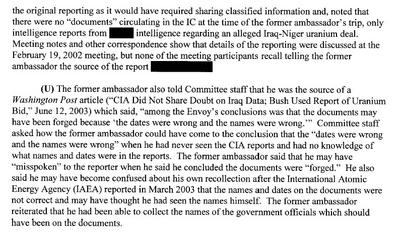Shattering Cherished Beliefs, or If I'd Known You Were Coming I Would Have Baked a YellowcakeI've been engaged in a rather spirited debate with liberal commenters over at
Lee Goldberg's blog. I thought I'd post a piece here about the Yellowcake story so we can put this to bed. Then I can move on to the next piece of nonsense; the supposed effort by President Bush to tie Saddam to 9-11.
The "lie" about yellowcake is a cherished belief on the left largely because they don't expose themselves to a wider range of opinion and news.
The yellowcake (a form of uranium) story concerns sixteen words that were included in President Bush's 2003 State of the Union Address:
The British government has learned that Saddam Hussein recently sought significant quantities of uranium from Africa.There was some controversy over this intelligence well before the State of the Union Address, and as a result
Joe Wilson, a former ambassador, was sent to Niger. He reported in the New York Times after the State of the Union that he'd investigated the yellowcake story between sips of mint tea and determined that there was nothing to it.
This created something of a media sensation, as Wilson appeared on 60 Minutes and immediately became lionized by the Democrats.
This article, pointed out by Writergurl, gives a fairly good account of the controversy as it existed in 2003, and I suspect this is the part she'd want me to hone in on:
Bush said the CIA's doubts about the charge -- that Iraq sought to buy "yellowcake" uranium ore in Africa -- were "subsequent" to the Jan. 28 State of the Union speech in which Bush made the allegation. Defending the broader decision to go to war with Iraq, the president said the decision was made after he gave Saddam Hussein "a chance to allow the inspectors in, and he wouldn't let them in."
Bush's position was at odds with those of his own aides, who acknowledged over the weekend that the CIA raised doubts that Iraq sought to buy uranium from Niger more than four months before Bush's speech.And she specifically points to this part:
A four-star general, who was asked to go to Niger last year to inquire about the security of Niger's uranium, told The Washington Post yesterday that he came away convinced the country's stocks were secure. The findings of Marine Gen. Carlton W. Fulford Jr. were passed up to Gen. Richard B. Myers, chairman of the Joint Chiefs of Staff -- though it was unclear whether they reached officials in the White House.
A spokesman for Myers said last night that the general has "no recollection of the information" but did not doubt that it had been forwarded to him. "Given the time frame of 16 months ago, information concerning Iraq not obtaining uranium from Niger would not have been as pressing as other subjects," said Capt. Frank Thorp, the chairman's spokesman.Okay, so we have several charges implied here:
1. Wilson's charge that his trip to Niger had disproved the yellowcake story.
2. That Bush lied when he said that the CIA's objections to the story were subsequent to the State of the Union Speech.
3. Arguably, that Bush was notified by Myers of Marine General Fulford's doubts.
Fortunately we do not have to search hard for the answers to these allegations. The Senate Committee on Intelligence
conducted hearings (PDF file) to answer these and more questions. Their report on the Niger story takes up pages 36-83 of the report (which corresponds to pages 46-93 of the PDF file)
On Wilson's trip, the evidence did not support Joe Wilson's version of events as related in several newspaper stories. Indeed, the Committee seems quite unimpressed with Ambassador Wilson's veracity as these key paragraphs indicate:
(Note: You can click on the pictures here to make them larger)


However, interestingly, the CIA liked Wilson's report, mainly because it proved for them something exactly opposite to what Wilson later claimed:

So I think we can dispense with allegation #1, that Joe Wilson's trip to Niger had disproved the yellowcake story.
What about when the CIA changed its assessment of the yellowcake story? It's pretty obvious that it was not before the State of the Union Address from this bit:

And in fact, the first time the CIA changed its position was sometime in the spring of 2003, but even then the President was not notified according to this:

So I think we can drop allegation #2, which is that the CIA had indicated objections to the uranium allegations prior to the State of the Union Address.
Which leaves us with #3, the doubts of Marine General Fulford. That is mentioned only briefly in the Intelligence Committee report:


There is no indication at any point that this information was shared with the White House, and even Fulford's account in the Washington Post piece acknowledged that his superior, Chairman of the Joint Chiefs of Staff Richard Myers could not remember reading it. So there is zero evidence for allegation #3.
And that's about it, folks. I know that the liberals reading this will not be pleased and no doubt will start in with the Valerie Plame stuff, which I'm not interested in. There are plenty of bloggers covering that; Tom Maguire's made
himself the expert on the conservative side.



